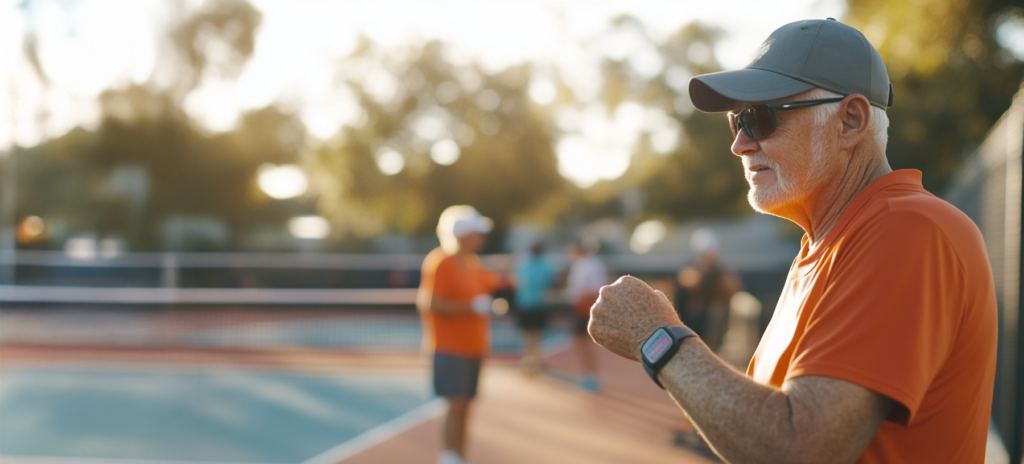How to Track an Elderly Person

As our parents and loved ones age, it becomes increasingly important to ensure their safety and well-being. One way to do this is by using a GPS tracker designed specifically for elderly care. These devices let you track loved ones and get alerts for location changes or emergencies. In this article, we will discuss the importance of monitoring aging parents, the benefits of using GPS trackers for seniors, and how to choose the right GPS tracker for your loved one. We will also cover legal and ethical considerations, and conversation tips for discussing GPS tracking with parents. GPS Trackers for Elderly Care GPS trackers for seniors are small, wearable devices that use satellite technology to provide real-time location information. These devices can be worn as a bracelet, pendant, or clipped onto clothing. They are designed to be discreet and comfortable, so your loved one can wear them without feeling self-conscious. Importance of Monitoring Aging Parents As our parents get older, they may face challenges with their health and thinking abilities, making independent living tough. Furthermore, this can lead to safety concerns, including wandering, falls, and medication mismanagement. By monitoring your elderly parents, you can ensure their safety and provide the support they need to remain independent. Benefits of Using GPS Trackers for Seniors GPS trackers for seniors offer several benefits, including: Peace of Mind for CaregiversOne of the primary benefits of GPS trackers for seniors is the peace of mind they offer to caregivers. Knowing they can easily locate their loved one in emergencies or if they wander off brings reassurance and security. Caregivers can monitor their whereabouts in real-time during quick errands or leisurely walks, reducing anxiety and stress.2. Enhanced Safety for Seniors GPS trackers greatly improve safety for seniors, especially those with dementia or Alzheimer’s who tend to wander. By wearing a GPS tracker, seniors can maintain their independence while still receiving assistance if needed. In emergencies, caregivers can swiftly find and help loved ones, potentially saving lives. 3. Geo-Fencing and Location Alerts Senior GPS trackers often include geo-fencing, letting caregivers set virtual boundaries around home or familiar areas. If the senior strays outside of these boundaries, caregivers receive an alert, enabling them to take immediate action. This feature is especially useful for preventing wandering and ensuring that seniors stay safe within familiar surroundings. 4. Emergency Response and Assistance In the event of an emergency, GPS trackers for seniors can be a lifesaver. Seniors can quickly alert caregivers or emergency services with the press of a button, ensuring swift assistance whenever necessary. This feature boosts seniors’ confidence and security, knowing help is readily available whether they’re at home or out. 5. Location History and Activity Monitoring Many GPS trackers for seniors provide features like location history and activity monitoring. Caregivers can track their loved one’s movements to spot patterns, monitor daily activities, and detect any changes in behavior that may indicate health or safety concerns.By keeping tabs on their loved one’s whereabouts and activity levels, caregivers can provide better support and intervention as needed. GPS trackers for seniors offer various benefits, promoting safety, independence, and peace of mind for both caregivers and seniors. They provide real-time location tracking, emergency assistance, and activity monitoring, ensuring the well-being of aging loved ones. Through technology, caregivers can support their loved ones while preserving their independence and quality of life. Features to Consider in GPS Trackers When choosing a GPS tracker for your loved one, there are several features to consider: Real-time tracking: Look for a device that offers real-time tracking, so you can see your loved one’s location in real-time. Geofencing: Geofencing allows you to set up virtual boundaries around specific areas, such as your loved one’s home or neighborhood. If your loved one leaves the designated area, you will receive an alert. SOS button: An SOS button allows your loved one to quickly and easily call for help in the event of an emergency. Battery life: Look for a device with a long battery life, so you don’t have to worry about charging it frequently. Ease of use: Choose a device that is easy for your loved one to use and understand. How to Choose the Right GPS Tracker When choosing a GPS tracker for your loved one, consider their specific needs and preferences. For example, if your loved one has dementia or Alzheimer’s, you may want to choose a device with additional safety features, such as fall detection or wandering alerts. You should also consider the device’s size, weight, and design, as well as its cost and any associated fees. Legal and Ethical Considerations for Tracking Elderly Parents Before using a GPS tracker to monitor your loved one, it’s important to consider legal and ethical considerations. In general, it’s legal to use a GPS tracker to monitor a loved one as long as you have their consent. However, you should still consult with a lawyer to ensure that you are complying with all relevant laws and regulations. Additionally, it’s important to have an open and honest conversation with your loved one about why you want to use a GPS tracker and how it will benefit them. Conversation Tips for Discussing GPS Tracking with Parents Discussing GPS tracking with your aging parents can be a sensitive topic. Here are some conversation tips to help make the discussion go smoothly: Be respectful: Approach the conversation with respect and empathy, and listen to your loved one’s concerns and opinions. Explain the benefits: Explain how a GPS tracker can benefit your loved one, such as providing peace of mind and improved safety. Address privacy concerns: Address any privacy concerns your loved one may have, and assure them that the GPS tracker is only being used for their safety and well-being. Involve them in the decision-making process: Involve your loved one in the decision-making process, and allow them to choose the GPS tracker that they feel most comfortable with. Utilizing Seculife SOS GPS Elderly Tracker The Seculife SOS GPS Elderly Tracker is a
How Accurate Are Fall Detection Devices?

How Accurate Are Fall Detection?– Falls are a significant concern for the elderly and those with mobility issues. According to the Centers for Disease Control and Prevention (CDC), one out of every five falls causes a serious injury such as broken bones or a head injury. In light of these alarming statistics, fall detection devices have emerged as a popular solution to help prevent these injuries and provide peace of mind for both the individual and their loved ones. But how accurate are these devices? In this blog, we will discuss fall detection, exploring what it is, who should use fall detection devices, how they work, and their accuracy. Key Takeaways: After crashes related to traffic, falls are the second most common unintentional cause of death worldwide in terms of injury-related fatalities. Fall-related injuries and fatalities are more likely to occur in vulnerable groups, such as those with hearing and vision problems, those living alone, and those with various medical conditions. The growing popularity of fall detection devices among seniors reflects a growing recognition of the need for proactive safety measures. These devices use advanced sensors to detect falls and instantly notify caregivers or other designated contacts to provide aid. Even with ongoing advancements in technology, 100% accuracy in fall detection is still unattainable which sometimes causes false alarms. However, in order to improve reliability over time, manufacturers are constantly improving accuracy by analyzing sensor data. Consumers that considers a fall detection device purchase should consider aspects like cost, performance, and reliability. Popular potential include GPS-enabled trackers, smartwatches, medical alert systems, and home monitoring installations. Each of these offers unique features and benefits that users can customize to meet their needs. What is Fall Detection? Fall detection is a feature that automatically detects when a person has fallen and sends an alert to a monitoring center, family member, or caregiver. This feature is typically found in medical alert systems, but it can also be found in smartwatches and other wearable devices. These devices primarily ensure prompt dispatch of help in the event of a fall, potentially preventing serious injuries and even saving lives. Who Should Use Fall Detection Devices? Fall detection devices are recommended for anyone who is at risk of falling. This includes the elderly, people with mobility issues, and those with certain medical conditions. According to the National Council on Aging, falls are the leading cause of fatal and non-fatal injuries for older adults. Wearable fall sensors can provide an added layer of protection and peace of mind for both the individual and their loved ones, ensuring that help is always at hand in case of an accident. How Fall Detection Devices Work Fall detection devices use advanced sensors to detect changes in movement and orientation. The device sends an alert to a monitoring center, family member, or caregiver when it detects a fall. Some devices also have a manual button. You can press it in an emergency. This provides an extra layer of safety. The technology of these devices is always evolving. Manufacturers strive to improve accuracy and reduce false alarms. Are Fall Detection Devices Accurate? The accuracy of fall detection devices varies. It depends on the device and the wearer. A study found this. The Journal of Medical Internet Research published it. It found that fall detection devices are 73% to 98% accurate. But, some factors can affect the accuracy of fall detection devices. These include the type of fall, the person’s movements, and the device’s placement. For example, the system may not detect slow or gradual falls as accurately as sudden falls. Thus, it’s crucial to choose a device that best suits the individual’s needs and lifestyle. Pros and Cons of Fall Detection Devices Like any technology, fall detection devices come with their own set of advantages and disadvantages. Understanding these can help you make an informed decision about whether these devices are the right choice for you or your loved ones. Pros Provides an added layer of protection and peace of mind for both the individual and their loved ones. Automatically detects falls and sends an alert to a monitoring center, family member, or caregiver. Can help prevent serious injuries and reduce hospitalization costs. Can be worn discreetly and comfortably. Cons Can be expensive, with some devices costing several hundred dollars. May have false alarms, which can be annoying and cause unnecessary worry. May not detect all falls, especially slow or gradual falls. Some devices may be uncomfortable or difficult to wear. Fall Detection Devices: What’s On The Market? There are many fall detection devices on the market, ranging from medical alert systems to smartwatches. Here are some of the most popular devices: Medical Alert Systems Medical alert systems are designed to provide emergency assistance for older adults and those with mobility issues. These systems typically include a base station and a wearable device that can detect falls and send an alert to a monitoring center. Smartwatches: Smartwatches are becoming increasingly popular for fall detection, as they can be worn discreetly and offer many other features. GPS Tracking Devices: Fall detection technology is also included in several GPS tracking devices. These devices offer emergency assistance and real-time location tracking. According to studies, these devices often identify between 70% and 90% of signals. Fall detection devices can provide an added layer of protection and peace of mind for those at risk of falling. While the accuracy of these devices varies, they can help prevent serious injuries and reduce hospitalization costs. When choosing a fall detection device, it’s important to consider the individual’s needs and preferences, as well as the device’s accuracy, comfort, and cost. With the right device, you can ensure that you or your loved ones are always protected, no matter what.
